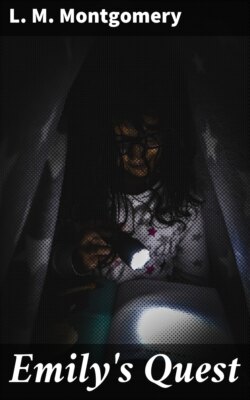Читать книгу Emily's Quest - L. M. Montgomery - Страница 16
На сайте Литреса книга снята с продажи.
I
ОглавлениеTable of Contents
At first nobody thought Mr. Carpenter’s illness serious. He had had a good many attacks of rheumatism in recent years, laying him up for a few days. Then he could hobble back to work, as grim and sarcastic as ever, with a new edge to his tongue. In Mr. Carpenter’s opinion teaching in Blair Water school was not what it had been. Nothing there now, he said, but rollicking, soulless young nonentities. Not a soul in the school who could pronounce February or Wednesday.
“I’m tired trying to make soup in a sieve,” he said gruffly.
Teddy and Ilse and Perry and Emily were gone—the four pupils who had leavened the school with a saving inspiration. Perhaps Mr. Carpenter was a little tired of—everything. He was not very old, as years go, but he had burned up most of his constitution in a wild youth. The little, timid, faded slip of a woman who had been his wife had died unobtrusively in the preceding autumn. She had never seemed to matter much to Mr. Carpenter; but he had “gone down” rapidly after her funeral. The school children went in awe of his biting tongue and his more frequent spurts of temper. The trustees began to shake their heads and talk of a new teacher when the school year ended.
Mr. Carpenter’s illness began as usual with an attack of rheumatism. Then there was heart trouble. Dr. Burnley, who went to see him despite his obstinate refusal to have a doctor, looked grave and talked mysteriously of a lack of “the will to live.” Aunt Louisa Drummond of Derry Pond came over to nurse him. Mr. Carpenter submitted to this with a resignation that was a bad omen—as if nothing mattered any more.
“Have your own way. She can potter round if it will ease your consciences. So long as she leaves me alone I don’t care what she does. I won’t be fed and I won’t be coddled and I won’t have the sheets changed. Can’t bear her hair, though. Too straight and shiny. Tell her to do something to it. And why does her nose look as if it were always cold?”
Emily ran in every evening to sit awhile with him. She was the only person the old man cared to see. He did not talk a great deal, but he liked to open his eyes every few minutes and exchange a sly smile of understanding with her—as if the two of them were laughing together over some excellent joke of which only they could sample the flavour. Aunt Louisa did not know what to think of this commerce of grins and consequently disapproved of it. She was a kind-hearted creature, with much real motherliness in her thwarted maiden breast, but she was all at sea with these cheerful, Puckish, deathbed smiles of her patient. She thought he had much better be thinking of his immortal soul. He was not a member of the church, was he? He would not even let the minister come in to see him. But Emily Starr was welcomed whenever she came. Aunt Louisa had her own secret suspicion of the said Emily Starr. Didn’t she write? Hadn’t she put her own mother’s second-cousin, body and bones, into one of her stories? Probably she was looking for “copy” in this old pagan’s deathbed. That explained her interest in it, beyond a doubt. Aunt Louisa looked curiously at this ghoulish young creature. She hoped Emily wouldn’t put her in a story.
For a long time Emily had refused to believe that it was Mr. Carpenter’s deathbed. He couldn’t be so ill as all that. He didn’t suffer—he didn’t complain. He would be all right as soon as warmer weather came. She told herself this so often that she made herself believe it. She could not let herself think of life in Blair Water without Mr. Carpenter.
One May evening Mr. Carpenter seemed much better. His eyes flashed with their old satiric fire, his voice rang with its old resonance; he joked poor Aunt Louisa—who never could understand his jokes but endured them with Christian patience. Sick people must be humoured. He told a funny story to Emily and laughed with her over it till the little low-raftered room rang. Aunt Louisa shook her head. There were some things she did not know, poor lady, but she did know her own humble, faithful little trade of unprofessional nursing; and she knew that this sudden rejuvenescence was no good sign. As the Scotch would say, he was “fey.” Emily in her inexperience did not know this. She went home rejoicing that Mr. Carpenter had taken such a turn for the better. Soon he would be all right, back at school, thundering at his pupils, striding absently along the road reading some dog-eared classic, criticising her manuscripts with all his old trenchant humour. Emily was glad. Mr. Carpenter was a friend she could not afford to lose.
